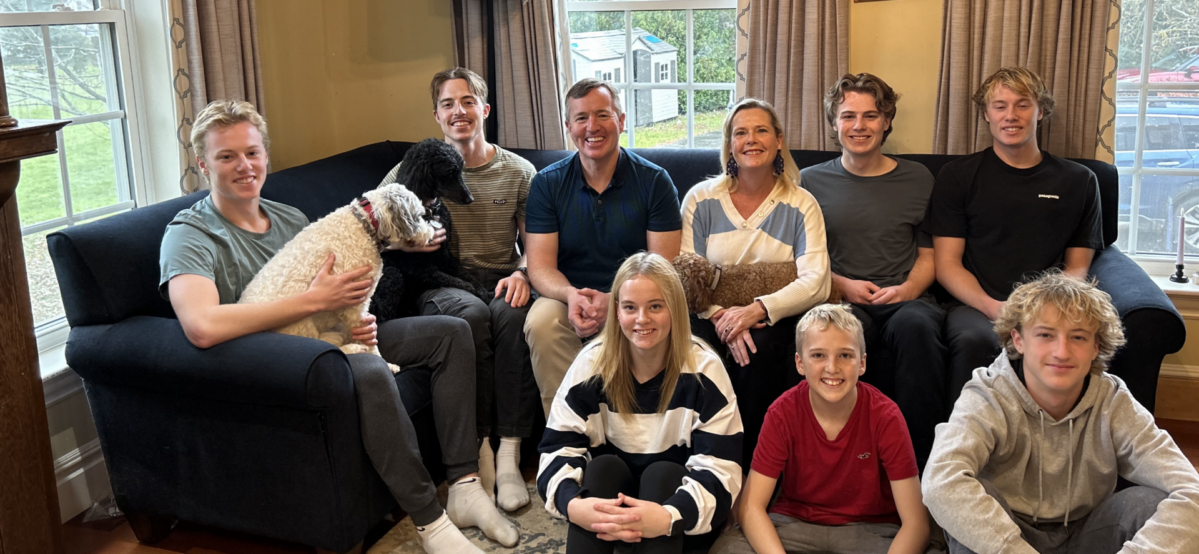Dal Medicine grads donate to cutting-edge cancer therapy
December 7, 2023
Dalhousie Alumni, Drs. Mark Johnston and Ann Swain have the best reason in the world to be giving back to Dalhousie University’s Faculty of Medicine: medical research saved their son Ewan’s life.
It was 2017, and Ewan was just 15 years old. He was snorkeling during a family vacation when his parents – both doctors and Dal Med School Alum – noticed something odd. Ewan’s snorkeling mask caught on a mole on the teenager’s forehead, and the mole began bleeding.Mark and Ann, who live in Port Williams, N.S. with their seven children, were worried. A week after seeing a dermatologist, the family got terrifying news: Ewan had melanoma.
Doctors immediately removed Ewan’s mole and performed further testing. After a follow-up appointment, however, Mark and Ann learned the cancer had metastasized to one of his lymph nodes.
On December 21st —the longest night of the year—PET scans revealed Ewan’s cancer had spread to his liver, both femurs, and spine. The family was devastated. Mark and Ann knew that cutting-edge research was their only hope.
Beating the odds
The odds were not in Ewan’s favour, but he was about to beat them.
Around the time of Ewan’s diagnosis, a new study published in the New England Journal of Medicine showed the combination of two immunotherapy drugs, nivolumab and ipilimumab, were dramatically increasing the survival rates of people with this kind of advanced melanoma. Five years previously, Ewan’s diagnosis carried a 5% survival rate. Now, thanks to research, he had a fighting chance.
In January 2018, Ewan began the new cutting-edge protocol. The family was told Ewan was the first person in Nova Scotia to receive the combination treatment.
By March, Ewan was cancer-free. Five years later, he remains in remission. Now, Mark and Ann want to fuel medical research right here in Nova Scotia to ensure more families get access to the groundbreaking discoveries that result in miracles, like the one they experienced.
Fueling medical research
Mark and Ann will be matching every donation made to this Molly Appeal up to $50,000. Your gift today will double the impact to medical research at Dalhousie’s Faculty of Medicine.
Mark and Ann hope their family’s gift will encourage others to donate, so that together their efforts can change and save more lives.
Stand with Ewan’s family by supporting Medical Research at the Faculty of Medicine.

Fuelling cancer research
That’s why they’re donating $50,000 to the work Dr. Carman Giacomantonio is leading at Dalhousie. He’s investigating why immunotherapy works so well with some people – like Ewan – and is unsuccessful in beating other people’s cancers.
Dr. Giacomantonio’s research involves finding ways to leverage immunotherapy, to make cancerous tumours more recognizable to the immune system.
He’s been successfully using this strategy for years with melanoma, and is now trying to transfer what he’s learned to treat prostate cancer.
Dr. Johnston likens the combination immunotherapy Ewan received to a fuel.
“What Carman’s playing with is different kinds of sparks that might make this fuel burn even better,” Dr. Johnston says.
He hopes his family’s gift will encourage others to donate, so that together, their combined efforts can support Dr. Giacomantonio as he identifies ways to make immunotherapy work as successfully for others as it did for Ewan.
Throughout Ewan’s illness and treatment, Dr. Johnston and his family were buoyed by the support of the healthcare staff at the QEII, their community members, and even strangers.
Dr. Johnston and Dr. Swain had put out a call on Facebook for people to share their own experiences with melanoma and with immunotherapy.
“We had hundreds and hundreds of people that sent us ideas and information and reached out to try to help,” Dr. Johnston says. “It was like the world’s largest clinical trial.”
Some of the information the family received was new to them, and some of it reinforced what they had already read. All of it helped them feel more active and in control as they pursued this new treatment.
They hope to extend the same approach – working together to make a difference – in garnering support for the Dalhousie research on immunotherapy.
“What can we do to help other people out? What can we do to change things? That resonates with me,” Dr. Johnston says.
“Let’s make it better.”
TAGS
